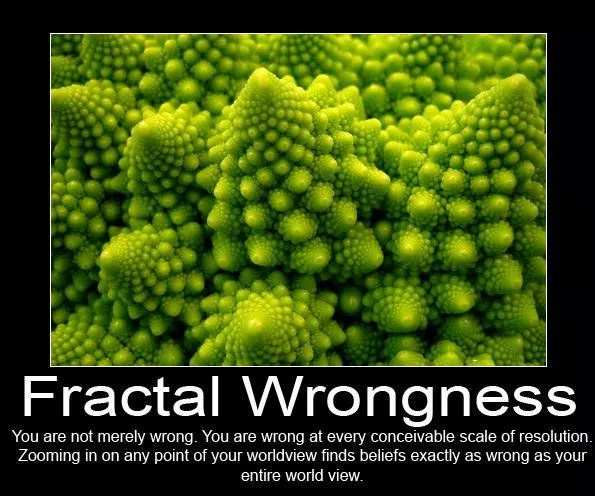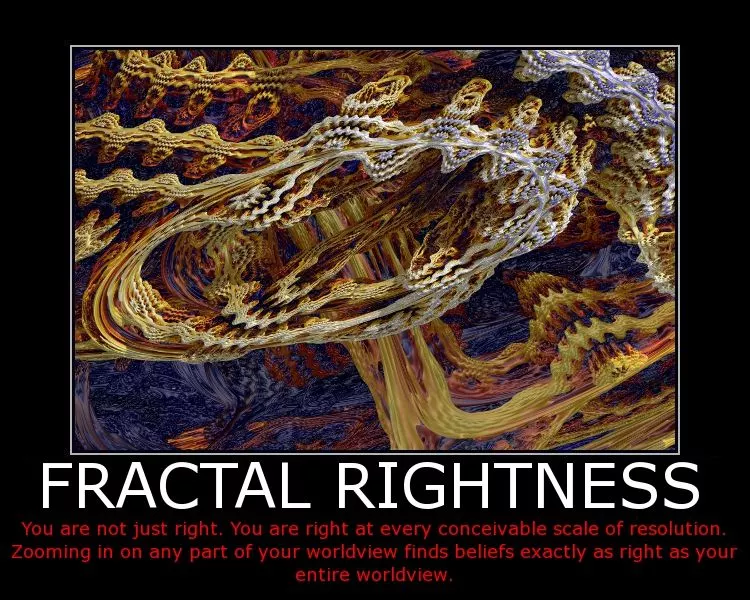“The human mind is a delusion generator, not a window to truth.” ~ Scott Adams
The interesting thing about being wrong is that you are more likely to be right by admitting you are more likely wrong than by declaring that you are more likely right.
As soon as your head stops spinning, I’ll explain.
The human condition is a double-edged sword: we’re fallible, imperfect, and prone to mistakes on the one side, and yet we have the capacity for reason, logic, and open-mindedness on the other.
Both sides can be sharp or dull depending upon the person and the situation. Or upon the delusion or misrepresentation. Or upon the level of self-trickery or inception involved.

But it goes deeper than that. We could be wrong even about the very nature of reason, logic, delusion, and open-mindedness.
Indeed, we could be wrong about everything, in infinite regress, a kind of recursive infinite wrongness. It could all be an illusion of a delusion of an illusion of yet another delusion, ad absurdum. Or, maybe not.
One can easily slip into a blackhole of overthinking, just trying to make sense out of it all. But we can only self-correct from where we are. And where we are is a fallible, imperfect, prone to mistakes, naked ape swimming in the uncertain waters of fractal wrongness vainly trying to be right despite a universe that dwarfs any notion of rightness or wrongness that we might have.
Luckily, or unluckily (or Meta-luckily), we have right Now to consider – this instant, this immediate and ever disappearing-reappearing promptly-imperfect present – to put it all into perspective somehow, to dissect, resect, and vivisect the animal of our fractal wrongness as we fall ever-further into deeper wrongness even while we self-correct into higher rightness that will still be wrong.
But just as the journey is the thing, so too is the fall.
As Samuel Beckett said, “Ever tried. Ever failed. No matter. Try Again. Fail again. Fail better.”
Logic, Reasoning, and Probability:
“There is a way of being wrong which is also sometimes necessarily right.” ~ Edward Abbey
Here’s the thing: Nobody is off the hook for being wrong. The best we can do is get better at recognizing the hook for what it is so that we are less likely to get dragged away by it. By developing and practicing disciplined strategies for cutting the line and negotiating the hook before the Fisherman of Close-mindedness can reel us into his Boat of Dogmatism.
Our fractal wrongness is ever-present. And that’s okay. Similarly, the universe is meaningless. And that’s okay as well. Just as the existentialists response to a meaningless universe is to create meaning, despite; the reasonable persons response to fractal wrongness is to self-correct, despite.
The first step is to embrace fractal wrongness for what it is. It’s ever-present and all consuming. So be it. The second step is to use tools and strategies toward self-correcting, despite the possibility that even those tools and strategies could be wrong.
The most effective tools we have are logic, reasoning and the use of probability. The most effective strategy we have is to use these tools to question and interrogate the veracity of reality and the validity of our perception of it.
We use reason to interpret reality and to interpret our interpretation of reality. We use logic to interpret the sequence of those interpretations through time and space. We use probability to interpret the likelihood of those interpretations being valid or not, according to reality.
Sometimes we have no way of knowing whether our interpretations are logical or not until later. Or maybe never. For example, the millions of people who believed that their interpretation of the earth being flat and geocentric was true, never realized that their interpretations were false according to the dictates of reality.
Pride and Seriousness:
“Pride is pride not because it hates being wrong, but because it loves being wrong: To hate being wrong is to change your opinion when you are proven wrong; whereas pride, even when proven wrong, decides to go on being wrong.” ~ Criss Jami
So, we’re more than likely wrong. Good. Now that our skeptics hat is on and our rose-colored glasses have been left hanging off the last self-similar fractal of wrongness in our rear view mirror, we can begin to self-correct.
 All the while understanding that even our self-corrections will more than likely be wrong (a better wrong), and that they will just become the latest box we’ll have to think outside of, the latest paradigm we’ll have to break, and the latest comfort-zone we’ll have to stretch.
All the while understanding that even our self-corrections will more than likely be wrong (a better wrong), and that they will just become the latest box we’ll have to think outside of, the latest paradigm we’ll have to break, and the latest comfort-zone we’ll have to stretch.
Nothing entrenches us in our wrongness more than being convinced that we’re right.
As Nietzsche said, “Convictions are more dangerous foes of truth than lies.”
But what is it that bolsters our conviction? What is it that shores up our certainty and blinds us from seeing past our deceptively conceived anti-questioning ramparts? There is a plethora of logical and cognitive fallacies out there, but perhaps the primary thing that reinforces conviction is pride and seriousness.
We are a smug and vain (prideful) species, even as we stare like a deer in headlights into eternity. We’re a solemn and self-important (serious) animal, even as we’re dwarfed by a suffocating and colossal universe. Even with our ability to reason logically using probability to interpret it all, we somehow manage to use it to keep ourselves comfortable, safe, and secure in our worldview.
As Kathryn Schulz said, “Our love of being right is best understood as our fear of being wrong.”
And so, we put on airs. We haughtily stand by our convictions. We’re heavy with uppity self-seriousness, even as we’re standing on the razor-thin ice of our beliefs.
Something has got to give. We cannot self-correct in a vacuum. We must embrace that vacuum and squeeze all the hot air out of it lest we fall further into ignorance.
There must be a way to make the fractal wrongness of the human condition more flexible and less rigid, more adaptable and less intractable, more of a playful game and less of a serious standoff.
 Humor and Meta-(Non)sense:
Humor and Meta-(Non)sense:
“It is very unnerving to be proven wrong, particularly when you are really right and the person who is really wrong is proving you wrong and proving himself, wrongly, right.” ~ Lemony Snicket
So, the universe is meaningless and we’re mired in fractal wrongness. So be it. It’s time to have fun with it. It’s time to create meaning and self-correct, despite. It’s time to reverse-engineer our engineering, reprogram our programming.
It’s time to turn the tables on the cosmic joke by simply laughing at it. In short: it’s time to go Meta with the foolishness of it all. Keep using the sound tools of logic, reasoning, and probability. Keep deflating self-important seriousness into authentic sincerity.
But have fun with it. Laugh at it. Play with it. Tease it. Dance with it. Re-imagine it in ways that shock your soul into heightened awareness. Shoot yourself in the foot before someone else does, or before the passage of time deems your work outdated and uncouth.
Being wrong isn’t so bad. It can be fun if you let it be. It just depends upon your perspective. Just remember: we’re all wrong.
As Chuck Klosterman said, “Everybody is wrong about everything, just about all the time.”
Indeed.
We’re all stumbling, fumbling apes with big brains vainly attempting to pigeonhole our myopic view of truth into tiny boxes that the next generation will either flatten, discard, burn, or simply ignore. So be it. It’s all laughable. It’s all a joke. We might as well own it and then get better at being wrong by being less serious about being right.
At the end of the day, self-correcting in the muck and mire of fractal wrongness is a deliciously deceptive journey of labyrinthine proportions. But at least we have the wax wings of our imagination to fly up and get a better perspective from time to time, even if we do end up being wrong by eventually flying too close to the sun.
And when we inevitably fall, we’ll still have logic, reasoning, and probability as our bedrock. We’ll still have laughter and a good sense of humor to leverage a little fun into our journey of eternal wrongness.
Ever tried. Ever wrong. No matter. Try again. Be wrong again. Be wrong better. Then laugh even louder at the absurdity of it all.
Image source:




